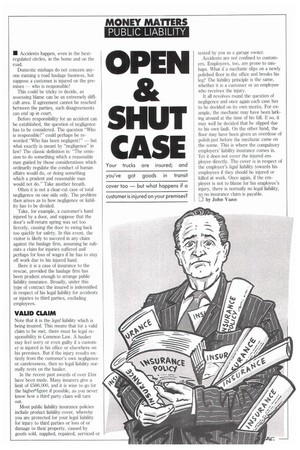• Accidents happen, even in the bestregulated circles, in the home and on the road.
Page 56

If you've noticed an error in this article please click here to report it so we can fix it.
Domestic mishaps do not concern anyone running a road haulage business, but suppose a customer is injured on the premises — who is responsible?
This could be tricky to decide, as assessing blame can be an extremely difficult area. If agreement cannot be reached between the parties, such disagreements can end up in court.
Before responsibility for an accident can be established, the question of negligence has to be considered. The question "Who is responsible?" could perhaps be reworded "Who has been negligent?" — but what exactly is meant by "negligence" in law? The classic definition is: "The omission to do something which a reasonable man guided by those considerations which ordinarily regulate the conduct of human affairs would do, or doing something which a prudent and reasonable man would not do." Take another breath.
Often it is not a clear-cut case of total negligence on one side only. The problem then arises as to how negligence or liability has to be divided.
Take, for example, a customer's hand injured by a door, and suppose that the door's self-return spring was set too fiercely, causing the door to swing back too quickly for safety. In this event, the visitor is likely to succeed in any claim against the haulage firm, assuming he submits a claim for injuries suffered and perhaps for loss of wages if he has to stay off work due to his injured hand.
Here it is a case of insurance to the rescue, provided the haulage firm has been prudent enough to arrange public liability insurance. Broadly, under this type of contract the insured is indemnified in respect of his legal liability for accidents or injuries to third parties, excluding employees.
VALID CLAIM
Note that it is the legal liability which is being insured. This means that for a valid claim to be met, there must be legal responsibility in Common Law. A haulier may feel sorry or even guilty if a customer is injured in his office or elsewhere on his premises. But if the injury results entirely from the customer's own negligence or carelessness, then no legal liability normally rests on the haulier.
In the recent past awards of over Lim have been made. Many insurers give a limit of £500,000, and it is wise to go for the higherifigure if possible, as you never know how a third party claim will turn out.
Most public liability insurance policies include product liability cover, whereby you are protected for your legal liability for injury to third parties or loss of or damage to their property, caused by goods sold, supplied, repaired, serviced or tested by you as a garage owner.
Accidents are not confined to customers. Employees, too, are prone to mishaps. What if a mechanic slips on a newly polished floor in the office and breaks his leg? The liability principle is the same, whether it is a customer or an employee who receives the injury.
It all revolves round the question of negligence and once again each case has to be decided on its own merits. For example, the mechanic may have been larking around at the time of his fall. If so, it may well be decided that he slipped due to his own fault. On the other hand, the floor may have been given an overdose of polish just before the mechanic came on the scene. This is where the compulsory employers' liability insurance comes in. Yet it does not cover the injured employee directly. The cover is in respect of the employer's legal liability towards his employees if they should be injured or killed at work. Once again, if the employer is not to blame for his employee's injury, there is normally no legal liability, so no insurance claim is payable. El by John Vann






















































































































































































